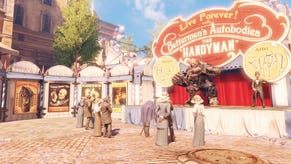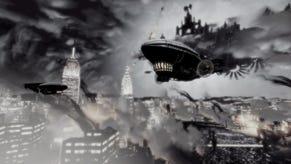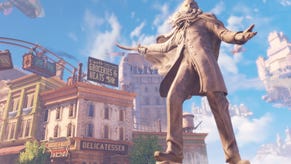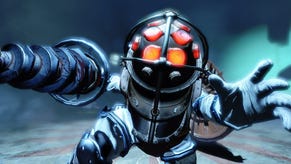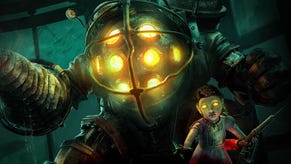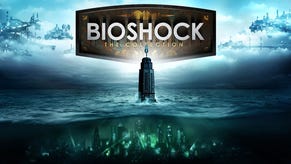Clouds and strife: The writing of BioShock Infinite - part two
BioShock: Infinite writer and director Ken Levine continues his chat with VG247′s Dave Cook about how Irrational Games created one of the most anticipated follow-ups of the generation. WITH SPOILERS.
"Where BioShock was much more about archaeology and digging up what happened, Infinite is more about character archaeology and finding out who these people are and what their secret are, what their mysteries are.”
Looking for part one of this article? Go here.
Something strange happened during my first and only trip to E3. It was 2011.
BioShock: Infinite was one of the show's biggest-hitters, and I was lucky enough to secure a seat for Irrational Game's behind-closed-doors presentation. The demo opened with Booker and Elizabeth wandering the streets of Columbia unopposed by the city guard or Vox Populi. Together they strolled through boutiques and sun-baked plazas. Pedestrians wandered around happily. It was a marked change from the chaos and decay of Rapture.
Elizabeth spotted a dying horse at the roadside. Despite Booker's objections she ran over to the animal and called on her ability to tear through the fabric of reality in an attempt to save it. With one surge of strength, she accidentally opened a portal to a dark street in the 1980s. The sound of "Everybody Wants to Rule the World" by Tears for Fears could be heard through the rainfall, while 'Revenge of the Jedi.' was being shown at the cinema over the road. In the distance, a truck sped towards the player.
Booker panicked, screaming at Elizabeth to close the rift. The truck's horn sounded as the vehicle bore down on them. More shouting. Panic. Additional shouting for heightened tension. At the last moment. Elizabeth collapsed the tear and returned the pair to Columbia, leaving a confused and terrified Booker asking, "What the hell was that?" The feeling was mutual, as the press started looking at one another, puzzled. What had we just witnessed and how did it relate to a game set in 1912? Just what was going on? Our whole understanding of the game had just been spun off its axis.
That precise scene didn't make it into the final game, and I was fascinated to find out exactly what happened to it, and indeed if other areas of the game were similarly lost or abandoned on some cutting room floor, never to see the light of day. It was just one area of Infinite's make-up that I wanted to clarify with writer and director Ken Levine. He was more than happy to set the record straight.
“There are like lots and lots and lots of drafts," Levine explained, "and I don't think we ever wrote a first draft start to finish then moved on. I think we wrote a section – we tend to write out of order – as that's just the requirement of the development processes. We come up with a plot, then we write levels to support that plot but did have to write some things completely out of sequence. You write the core, then implement out of sequence because there's no choice in terms of how production works."
He stressed that game writing is an evolution in process and that quite often, things do change. Plot strands become redundant as other areas of a story shift, or if plot-driving mechanics are given the chop. Levine highlighted the decision to make the first BioShock's encounter with Andrew Ryan a battle of philosophy and discussion, rather than a boss fight as particularly revelatory. The short version is that the horse scene simply felt out of sync with Elizabeth's understanding of her powers.
He continued, "In Infinite there were changes, like in the beginning, Elizabeth's tear powers were introduced later and her understanding of her own abilities was very, very limited. We realised because it was such a strange concept, so that if Elizabeth didn't understand them, and the player didn't understand them, or Booker didn't understand them, it made everything incomprehensible. So we re-jiggered a lot of things to make her … like you didn't actually see her open a tear until much later in the story, and then we said, 'Woah, right in the tower you're going to see her open a tear.'
“I always knew how the universes were connected. I always knew they took place in the multi-verse. That was very early. So we knew we were going back [to Rapture], but exactly the details of how they got there was another issue, as Elizabeth’s powers evolved a little bit along the way.”
"That sequence, originally took place later with her opening a tear in the street scene with the movie theatre, and then all of a sudden we were like, 'We need to have this scene happen right at the beginning,' and so the horse [scene] became irrelevant at that point. It was about observing her using this power that she knew about, so the meaning of the scene changed. So the element of that scene; we had to move its location, we had to move its chronology and we had to move certain things about it so it wasn't just a horse opening up to a random street scene.
"She was envisioning Paris and that showed her aspiration in this painting of Paris, and that she wanted to go there. Because of moving that element earlier, there were lot of changes that went with that. A lot of people ask me, 'Oh what about that scene with the horse? Why did you cut that scene?' It's not that we cut the scene. Other things came in and said, 'This is what matters', so we re-purposed the scene to happen much earlier, therefore the horse lost meaning.”
It's a known fact that the original BioShock: Infinite concept was set in Rapture. Columbia didn't actually exist at the start of the process, but that changed over time. Levine told me that he and his team didn't want to simply go, "back to the well," and rest on previous themes and concepts. Initially, the game would have depicted the downfall of Rapture before the events of the first game, but Levine felt that the mystery surrounding the Splicer uprising was so crucial to the city's tone and atmosphere that it was one puzzle best left to the imagination.
While BioShock: Infinite's DLC pack Burial at Sea will explore an alternate reality account of Rapture's collapse, Levine still views both titles as telling very different stories. I asked him if he ever felt pressured to create a play-space that surpassed Rapture. “To me, BioShock 1 was a game about Rapture. BioShock: Infinite is a game about Booker and Elizabeth," he replied, "so we really made a choice to go character-driven with Infinite. The city was important, that we really got that right and the art team did an amazing job.
"We really put a ton of passion and work into it, but you weren't doing the same kind of investigation you were in Rapture because the story was happening right in front of you. You didn't need that level of investigation. Where BioShock was much more about archaeology and digging up what happened, Infinite is more about character archaeology and finding out who these people are and what their secret are, what their mysteries are.
"So I didn't really worry about competing because the goals from a narrative standpoint were very different. We didn't have to carry the same weight that Rapture did, because otherwise it would just crowd out Booker and Elizabeth and they really had to have center stage. That's not to say we didn't love Columbia or put a huge amount of attention to it – it was huge – but at the end of the day it was secondary to Booker and Elizabeth.”
As you're no doubt aware the final BioShock: Infinite plot is a twisting affair full of reveals, warped realities, mysterious characters and a nagging sense of uncertainty. You really do get the feeling that things aren't quite right in Columbia, and that some theory-expelling reveal lies around the next corner. Levine confirmed that during testing, not a single person knew where the game's plot was headed. He admitted that there were times he didn't even know precisely where the story would take players, but several anchor points remained throughout development.
“I generally don’t validate any particular theory because whatever theory works for you as a gamer is valid right? But, I do really enjoy the amount of energy people put into tracking the events, because I can tell you we certainly put a lot of energy into it. I can certainly sit down with you and explain every factual thing, or support each factual thing, but to me that’s really uninteresting.”
“Things evolve, but we definitely had a sense that Booker and Elizabeth were connected," Levine recalled. "We went back and forth a lot on that connection, and the story was more complicated, Daisy Fitzroy was more involved with that connection earlier on. Then we realised that just added a huge amount of weight to the story-telling at the end that we couldn't afford."
One of those key anchor points was Rapture. There was no doubt in Levine's mind that Infinite would have to return there, but figuring out a good enough reason for this to happen proved challenging in its own right. The solution lay with Songbird, Elizabeth's sworn protector and one of BioShock: Infinite's key antagonists. While it's technically a villain, there's a sense of sympathy that creeps through when you realise its simply fulfilling its duty and doesn't want to see her come to any harm.
“I always knew how the universes were connected," Levine admitted. "I always knew they took place in the multi-verse. That was very early. So we knew we were going back [to Rapture], but exactly the details of how they got there was another issue, as Elizabeth's powers evolved a little bit along the way. Having the notion of drowning and Songbird being vulnerable to water, and having the reason they go there be because they have to do something about Songbird. That evolved.
“That was a way to wrap up the Songbird story, to show the transition. If Songbird – who was such a strong character – was going to go, Elizabeth was going to take control of that situation, do it in Rapture. The fact that the thing was vulnerable to water, well, where is there a lot of water? It all just sort of came together and the pieces started lining up.
“When you see ways to do two things at once … I mean you could have just gone to Rapture and have Songbird show up and then fight him there, but we realised you could also have it so that's the way Elizabeth dealt with him. She chose that particular world to go to for a reason because it was associated with water. That all added up and made a lot of sense for us. As a writer you're constantly looking for, 'Here's what I want to do, how do I get there, and how can I kill as many birds with one stone as I possibly can?'”
I posed to Levine that the idea that Songbird was this invincible, unrelenting pursuer would have been ruined if Booker suddenly turned around and shot it to bits during a climatic boss battle. He agreed and added, “I don't know how we could have had them fighting Songbird, beating him up and then killing him. It didn't seem to be nearly as powerful as that scene in – did you ever read of Mice and Men? Where George puts Lenny down? That's got to be the most heart-breaking scene in literature I've ever read.
"The fact that [George] knows what's going on and Lenny doesn't, and there's this mercy killing. To some degree Elizabeth is putting down her dog, her friend. To watch her do that and become that person was a clear sign that Elizabeth has changed, and she's taking control of her destiny. But it's also incredibly heart-wrenching and I don't see the same drama coming out of a boss fight.”
“We’ve all done things in our lives that we can truly be forgiven for, and I think there are some things in life we feel we’ll never be forgiven for, or that you don’t deserve forgiveness for. I think that obviously what Booker did to Elizabeth as a child – to Anna – was unforgivable.”
Everything that follows after Songbird's death serves as potentially confusing, with Elizabeth and Booker walking between worlds, discussing the fabric of reality and laying on more layers of plot. It's a complex narrative, one that has seen gamers the world over create flow charts in an attempt to make sense of it all. I asked Levine if he'd seen any of the charts made by the players.
“Yeah I have," he laughed. "There are flow charts we've made too. I generally don't validate any particular theory because whatever theory works for you as a gamer is valid right? But, I do really enjoy the amount of energy people put into tracking the events, because I can tell you we certainly put a lot of energy into it. I can certainly sit down with you and explain every factual thing, or support each factual thing, but to me that's really uninteresting.
“I'd rather give you the framework and then enough that people could put together those charts. The fact that people did is very gratifying because we wanted to give people enough information so they could start to put all the pieces together. It was very complicated to make sure we had a story that held together, that was that complex. Then it was a question of what don't we tell, because if it was just what you were told, it would be an 'explain-atron' story, and that's never interesting either.
“Someone in a podcast said, 'If I find out that Booker is actually this, I'm going to be so mad.' They had actually finished the game. My thought was, 'Listen you're going to rest easy because you're never going to find out anything', because there's nothing to find out. Whatever you felt is valid. My intent, my writer's intent doesn't matter.”
Taking a gamble on ambiguity and trusting in your audience's ability to use their imagination is an admirable quality that several games use to good effect. The go-to example is - of course - Gordon Freeman's silent protagonist in Half-Life. If Levine's intent was to spark debate and discussion surrounding the nature of BioShock: Infinite's multi-verse, then from where I'm sitting the game has absolutely achieved in that aim. I've had long discussions about where the time-line splits and re-connects, who the Letuce's were and what happened after that final fade to black.
The lack of concrete answers to questions of this nature could be seen as laziness on the writer's part, but in actual fact they are empowering. Whatever you decide happened at the end of the original Mass Effect 3 ending was your own personal resolution. There are no rights or wrongs. For a game to give us, the players such creative control over a story in our mind is a rare thing, and serves to spark many long and interesting 'water cooler' discussions among our fellow hobbyists.
For all its ambiguity, there is one central theme running throughout BioShock: Infinite that Levine feels strongly about. The notion of repentance. “We've all done things in our lives that we can truly be forgiven for, and I think there are some things in life we feel we'll never be forgiven for, or that you don't deserve forgiveness for. I think that obviously what Booker did to Elizabeth as a child – to Anna – was unforgivable.
"For him to have an opportunity to encounter her again, to subconsciously pursue her in a way, to arrive in a place and not even realise his connection to her, and then do what he could to unwind the poisonous knot he had made was a story that we felt was interesting. I'm way more interested in that story than the science-fiction elements. The science-fiction elements are at the service of that story, but I think that notion of, 'What is redeemable, what is repent-able?' is something that left a powerful impression that I think about in my own life.”
Several critics flagged up in their BioShock: Infinite reviews that the shooter-heavy sections in the game's final third diluted whatever sense of established and sustaining plot Levine had built up in earlier sections. I have to agree, but I'd add that the ending more than made up for it. Few games have left a lasting impression on me as this, and you can believe me when I say I was mulling that ending over for a good week after the credits rolled.
When you consider the density of BioShock: Infinite's plot, it's clear that the whole yarn must have presented Irrational Games with a precarious juggling act. It's similar to shows like Lost in that it provides more questions than answers for its duration, but unlike the island-hopping TV show, Infinite is largely resolute - deliberate ambiguity aside. By simply playing the game you can absolutely feel the enormity of the task at hand. You may feel that Levine's penmanship stumbled at several points, but as a whole, it holds together admirably.
Whatever Levine's writers intent may have been and whether you rate Infinite's plot or not, it's refreshing to see a game - a shooter no less - spark such widespread discussion and dissection as Irrational's story in the sky.







